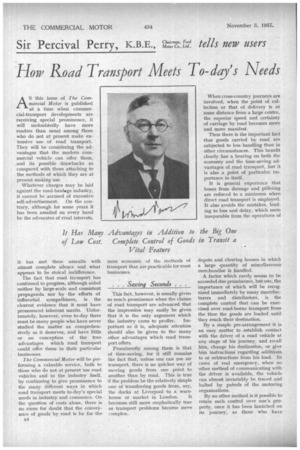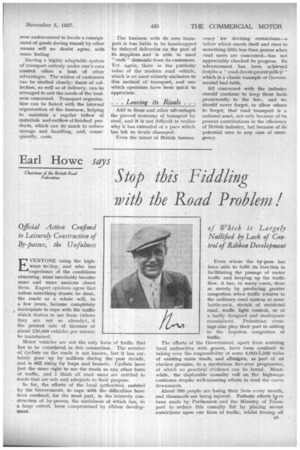Sir Percival Perry, K.B.E., i'vt,m67,i F fi d tells new users
Page 12

Page 13

If you've noticed an error in this article please click here to report it so we can fix it.
ow Road Transport Meets To-days Needs
S this issue of The Com mercial Motor is published
at a time when commercial-transport developments are receiving special prominence, it will undoubtedly have more readers than usual among those who do not at present make extensive use of road transport. They will be considering the advantages that the modern commercial vehicle can offer them, . and its possible drawbacks as compared with those attaching to the methods of which they are at present making use. • Whatever charges may be laid against the road-haulage industry, it cannot be accused of excessive self-advertisement. On the contrary, although for some years it has been assailed on every hand by the advocates of rival interests, When cross-country journeys are involved, when the point of collection or that of delivery is at some distance from a large centre, the superior speed and certainty of carriage by road becomes more and more manifest.
Then there is the important fact that goods carried by road are subjected to less handling than in other circumstances. This benefit clearly has a bearing on both the economy and the time-saving advantages of road transport, but it is also a point of particular importance in itself.
It is general experience that losses from damage and pilfering are reduced to a minimum when direct road transport is employed. It also avoids the mistakes, leading to loss and delay, which seem inseparable from the operations of it has met these assaults with almost complete silence and what appears to be stoical indifference.
The fact that road transport has continued to progress, although aided neither by large-scale and consistent propaganda nor by the efforts of influential sympathisers, is the clearest evidence that it must have pronounced inherent merits. Unfortunately, however, even to-day there must be many people who have never studied the matter as comprehensively as it deserves, and have little or no conception of the true advantages which road transport could offer them in their particular businesses.
The Commercial Motor will be performing a valuable service, both to those who do not at present use road vehicles and to the industry itself, by continuing to give prominence to the many different ways in which road transport meets to-day's special needs in industry and commerce. On the question of costs alone, there is no room for doubt that the conveyance of goods by road is by far the
E4 most economic of the methods of transport that are practicable for most businesses. depots and clearing houses in which a large quantity of miscellaneous merchandise is handled.
A factor which rarely seems to be accorded due prominence, but one, the importance of which will be recognized immediately by many manufacturers and distributors, is the complete control that can be exercised over road-borne transport from the time the goods are loaded until they reach their destination.
By a simple pre-arrangement it is an. easy matter to establish contact with the driver of a road vehicle at any stage of his journey, and recall him, change his destination,or. give him instructions regarding additions to or subtractions from his load. " In cases of real emergency, when no other method of communicating with the driver is available, the vehicle can almost invariably be traced and halted by patrols of the motoring organizations.
By no other method is it possible to retain such control over one's property, once it has been launched on its journey, as those who have
ever endeavoured to locate a consignment of goods during transit by other means will no doubt agree, with some feeling.
Having a highly adaptable system of transport entirely under one's own control offers a host of other advantages. The wishes of customers can be studied closely; times of collection, as well as of delivery, can be arranged to suit the needs of the business concerned. Transport organization can be linked with the internal organization of the business, helping to maintain a regular inflow of materials and outflow of finished products, which can do much to reduce storage and handling, and, consequently, costs The business with its own transport is less liable to be handicapped by delayed deliveries on the part of its suppliers and is able to meet " rush " demands from its customers. Yet again, there is the publicity value of the modern road vehicle, which is an asset entirely exc-lusive to this method of transport, and one which operators have been quick to appreciate.
. . . Leaving its Rivals . . .
Add to these and other advantages the proved economy of transport by oted, and it is not difficult to realize why it has extended at a pace which has left its rivals dismayed.
Even the talent of British bureau
cracy for devising restrictions a
talent which excels itself a-nd risi,s to something little less than genius when road users are concerned—has not appreciably checked its progress. Its advancement has been achieved despite a "road-development policy" which is a classic example of Governmental bad faith.
All concerned with the industry should continue to keep these facts prominently to the fore, and we should never forget, or allow others to forget, that road transport is a national asset, not only because of its present contributions to the efficiency of British industry, but because of its potential -uses in any case of emergency.


















































































